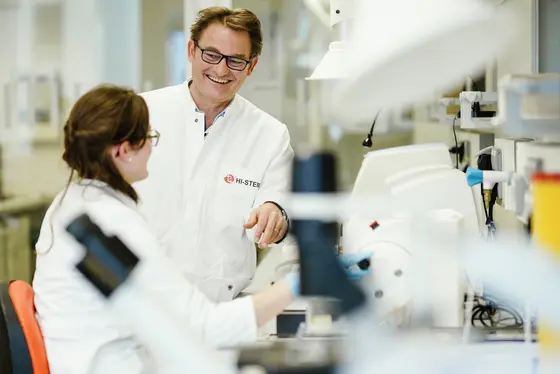The European Research Council promotes basic research in order to advance particularly forward-looking projects and open up new interdisciplinary areas of knowledge. For outstanding, already established researchers in Europe, the Council annually announces the “ERC Advanced Grants“, which are awarded in a highly competitive procedure.
Some types of cancer, which grow particularly aggressively and develop therapy resistance particularly early and frequently, are characterized by extreme damage to the genetic material. These include lung cancer, glioblastoma, metastases from various cancers, and the most aggressive form of acute myeloid leukemia, known as “AML with complex karyotype“ (CK-AML).
Chromosomal damages are complex: entire sections of genetic material are missing, others are duplicated, inverted, or completely reassembled. They can affect a single chromosome or the entire set of chromosomes. Researchers can hardly understand how cells with such puzzled-together sets of genetic material can be viable at all. It is poorly understood what mechanisms these cancer cells use to divide almost indefinitely while developing resistance to currently available therapies.
Using CK-AML as an example, Andreas Trumpp wants to get to the bottom of this mystery and investigate the molecular evolution of tumor cells at the single cell level over the time course of the disease: at the time of diagnosis, immediately after therapy, and at relapse.
For this purpose, Trumpp and colleagues use newly developed analytical methods that not only reveal the structural genetic variations, but also the resulting consequences on the molecular networks of cell control. The analyses are performed at the highest resolution down to the level of single cells. In this way, Trumpp and his team hope to understand which disruptions in the signaling networks confer dangerous stem cell properties on blood cancer cells, induce therapy resistance, or enable them to escape the immune system.
The knowledge gained from the analyses of cancer cells from affected individuals will then serve as the basis for developing new strategies to combat highly aggressive tumor cells by combining pharmacological and immunotherapeutic approaches. The new strategies will then be tested in mice to which human leukemia cells have been transferred. Successful treatment concepts will ultimately serve as the basis for new clinical trials.
With the project called “SHATTER-AML“, Trumpp wants to better understand which evolutionary processes occur in cancers characterized by structural genetic defects under the pressure of therapy. The results obtained from the example of CK-AML will also expand the understanding of other aggressive cancers that are also based on extensive chromosomal alterations. The goal of the scientists in Trumpp's laboratory is to develop more effective immunological and precision oncology therapies for these cancers, for which treatment options are often inadequate today.
* The Heidelberg Institute for Stem Cell Research and Experimental Medicine (HI-STEM) gGmbH was founded in 2008 as a public-private partnership by the DKFZ and the Dietmar Hopp Foundation



